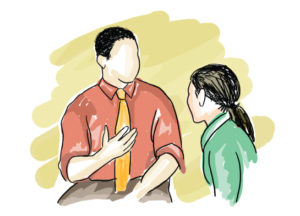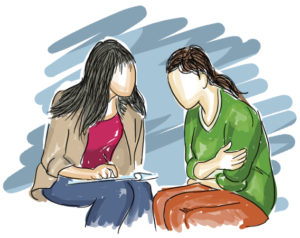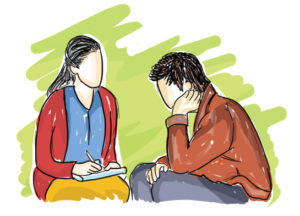Raymond looked sad. Not occasionally, but always. His features drooped. He hardly every smiled. Even after someone cracked a good joke or said something really funny, and everyone laughed, Raymond’s face would settle back into a gloomy expression.
In the counselling session, Raymond revealed his sad story. His father passed away soon after Raymond’s birth. So, he grew up without knowing a father’s care. Further, because of the superstitious beliefs of his family members, they blamed Raymond for bringing bad luck on the family.
Far from being loved or wanted, poor Raymond felt himself a burden. He really did not know what love or tenderness was.
We—fellow trainees in counselling—were moved by his story. Who would like to be in his situation, growing up unloved, and feeling worthless and a burden?
Something happened one day that changed all this. In one of the group therapy sessions, the main therapist, Dr Roger (all names have been changed), told Raymond that he need not go through life missing what he did not get. This was a revelation to Raymond. How would he get what he had always missed? How would he ever experience a father’s love?
What happened next was dramatic and moving. We were all sitting on mattresses on the floor. Raymond asked to be hugged and held. Dr Roger, a warm and caring man old enough to be Raymond’s father, held him in his arms. Raymond burst into tears. His whole body shook with his sobs. He had never been held lovingly, had never known what it means to be tenderly cared for. After a while, Dr Roger placed Raymond gently on the mattress. Raymond lay on his back with his eyes closed, still sobbing. He wept for a long time. We knelt or sat around, looking at his face attentively. Several of us had tears in our eyes. At one moment, Raymond opened his eyes. He saw the love in our faces. He noticed our tears. He burst into tears again. He never thought that people would care for him. He could never imagine anyone shedding tears for him.
From that day, we noticed a dramatic change in Raymond. His face changed! He started looking normal. Most of the time, he looked happy.
What I have described, changing some details, is a true story. I have seen people change through counselling. I have been personally helped by opening up to someone I trusted, and being listened to. I have found this to be enormously helpful, especially when I felt anxious, or confused, or felt resentment welling up in my heart.
This is why I believe in counselling.
What is counselling?
Simon, a college student, asked to meet Mrs. Jackie, one of his professors, who was known as a caring and trustworthy woman. Jackie’s area of teaching was not psychology, but mathematics; but students knew that she cared about them. She was not simply a machine distributing mathematical knowledge. She was a warm and genuine human being who cared about each student. Several students would later say that it was providential to have had Mrs Jackie in their life. Confiding in her helped many of them to make better decisions, and not mess up their lives.
“I fell in love during the summer vacation,” Simon told Jackie. “She is a wonderful girl. Ma’am, I think about her the whole time. I cannot concentrate on my studies. I want to be with her the whole time. I even think of quitting college and getting a job, so that I can marry soon, and be with her.”
Jackie listened to Simon with genuine interest, giving him her full and loving attention. She spoke very little. It was Simon who did most of the talking. Jackie did ask a few questions that helped Simon become clearer about his feelings, and the choices facing him.
This conversation—and a couple similar chats with Jackie in the coming weeks—helped Simon to understand what was happening—the normalcy and intensity of falling in love, what options were in front of him, which choice seemed to be wiser, the importance of knowing oneself and the other more in depth before making life-decisions.
Simon’s ardour for the girl cooled in the coming months. E-mails and phone calls showed both of them that, while they liked each other, they were not ready for marriage. In fact, there were several important areas in which they held sharply different views.
Simon is grateful to Mrs Jackie for listening to him patiently and with concern. She never blamed him, nor laughed at him. She did not take decisions for him. She understood the intensity and beauty of falling in love—and also its limitations and pitfalls.
Simon sees now that it would have been a mistake to quit college, start working and marry very young. He had not thought things through clearly or deeply. Talking with Jackie helped him to see many things more in perspective.
This is counselling.
It is not a technique. It is the meeting between two human beings, of whom one is under distress, and the other is a caring and genuine person with adequate life experience who is willing to give the troubled person full and loving attention.
The magic of listening
This is easily said, but extremely rare.
Why?
Because listening is a rare and lovely thing. It is harder than speaking, tougher than preaching and very different from advice-giving. Those who rush to give advice—especially when done without first understanding the other in depth—will be poor counsellors. They tend to impose their ideas and preferences on others, thinking that their plans and decisions are the best for other people.
Good counsellors listen.
They listen to the words being said, e.g., “I am in love,” or “I have thought of suicide” or “I do not know what to do ever since my wife died.”
These words are easy to understand. Anyone can follow their dictionary meaning.
The harder—and more important part—is to understand the feeling behind the words. How does it feel to be in love and long to be with the loved one? Why is this intelligent and capable woman thinking of suicide? How does a person feel after one’s life partner had died?
These are deeply emotional issues. We cannot glibly respond, saying, “Ya, I understand how you feel.” The truth is that most of the time we do not understand. Or, better, we understand the words; we miss the depth of feeling behind the words.
When Manju, my thirty-seven-year-old niece, died of cancer, I cannot say I “understood” how her mother felt. Or what went on in the minds and hearts of her husband and her two little boys. To enter that sacred space, we need depth. We need love. We need to have the inner freedom to put our self-centred concerns aside and give another human being our total attention.
This hardly ever happens. Most of the time, our mind is full. Our life, our concerns, our agenda, our small or big pains, our frustrations and fun—all this take up our attention. To give full attention to another human being’s need or pain is far from easy.
Here is a case.
In a counselling training session, we were divided into groups of three. In each group, one person would speak for sixty seconds, the second person would repeat what the first had said, and third would check.
Before the exercise, all of us felt confident we would be able to repeat everything we heard. After all, what is sixty seconds? But it was humbling to realize that, even during that very short period, we were not fully attentive. Imagine how much we miss when someone speaks for thirty or forty minutes! Listening is neither easy, nor common.
This is one reason it is hard to find good counsellors.
Advice-givers abound. Preachers are legion. Far easier to give advice than to give full attention to someone. So, too, it is much easier to judge and condemn than to put ourselves in the other’s shoes.
Can I be a good counsellor?
Yes, you can—if you are a particular type of person.
What type?
First requirement: To be a warm and genuine human being.
Why warmth?
If you have a personal problem and want to get help, you look around for someone who communicates love. You will not open up to someone who is harsh, judgemental or bigoted. You look around for someone who seems to care about people. Listening to another human being with full attention demands a special type of love.
Why genuineness?
Just think of your family or religious community. Suppose you meet someone who is cleaver, charming and speaks beautiful words to people when they are present, but stab them in the back when they are absent, you will not trust that person. You will be right in thinking: If I open up to this person, who knows what s/he may say about me afterwards? This is why counsellors need to be genuine.
The person of the counsellor
If you want to learn cooking or making Powerpoint slides or mathematics or a new language, the teacher’s character does not matter. If they know the subject and can explain it clearly, you learn.
This is not so with counselling. It is a sacred and intimate meeting between two human beings. A human being is trusting another human being with what is very painful or beautiful or intimate or shameful or mystical. This no light sharing or table talk. We cannot enter into such a deep encounter as lightly as we start a discussion on sports or on the weather.
One study comparing ten different forms of group counselling and therapy, to find out which approaches were more effective in producing results, came up with this unexpected finding: The key factor in producing results (in helping people most effectively) is not the approach or method used, but the person of the counsellor.
 In other words, suppose Iam under distress—fear, jealousy, broken relationships, inability to control anger, sexual problems, or bitterness towards someone who hurt me. I am wondering whom to go to. Should I go for help to Eileen, who is a woman of wisdom and relates well, or to Esther, who has advanced college degrees, but seems to lack common sense and life-experience? It is better to go to Eileen than to Esther. Understanding life and people is different from academic brilliance or shrewdness in business.
In other words, suppose Iam under distress—fear, jealousy, broken relationships, inability to control anger, sexual problems, or bitterness towards someone who hurt me. I am wondering whom to go to. Should I go for help to Eileen, who is a woman of wisdom and relates well, or to Esther, who has advanced college degrees, but seems to lack common sense and life-experience? It is better to go to Eileen than to Esther. Understanding life and people is different from academic brilliance or shrewdness in business.
In this area, qualities matter more than qualifications.
Three More Checks
Besides having the qualities I mentioned, there are three other checks.
One: Do people confide in me and approach me to speak of personal matters? If someone is warm and genuine, and listens without judging, and seems to have good sense, people will notice it, and will open up to such a person. Whether the chat is called “counselling” or not, does not matter. Thus, if a priest is seen as friendly and sensible, several people will approach him after Sunday Mass, and ask, “Father, can I have a word with you?” or “Can you spare some time for my son?” The same is true of a caring principal or teacher or social worker.
Two: Can they be certain that what they tell you will remain confidential? This is an absolute must. A number of people do not trust anyone because they have had the bitter experience of telling something confidential to someone, and later finding that this other person revealed it to others. This is immoral. It is cheating in a very big way. What someone tells us in confidence must remain confidential. This is especially true of those with special responsibilities, like, priests, religious superiors, formators, teachers, etc.
Here is a case in point.
A college that wanted to provide counselling to students asked for volunteers from among the faculty. Those who volunteered and were willing to spare time for this, were given some basic training in listening and taught some do’s and don’ts. The whole venture collapsed very quickly. Do you know why? Some teachers would listen to students, and later betray their confidence through remarks like these, “Do you know that Mohan in the second year is in love with his classmate Keerthi?” or “Oh, God! I did not know that Andrew’s father is such an abusive drunkard!” Students soon got wind of this. The whole counselling programmes died an early death.
So, more than degrees in psychology or theoretical knowledge, the counsellor’s character is paramount. This includes that s/he be trustworthy and treat each person with respect. I may or may not agree with what you are doing or saying. You may tell me that you hate your mother, or that you are fed up with life. I will treat you with respect, believe in your potential for change and growth, and do all I can to stand by you.
This is sacred ground.
Carlo, an experienced counsellor and trainer, once told us: “When I meet a person for counselling, I often remove my footwear, for I am on sacred ground. I am meeting another human being.”
What makes the encounter sacred is not that we are talking of religious matters or engaging in cultic practices. The sacredness stems from the dignity of every human being.
Three: If you want to be a good counsellor—who understands people in depth, relates in depth and responds in ways that the troubled person finds helpful and healing—you need to have received counselling.
I tell seminar participants: If you haven’t played basketball, don’t become a basketball coach. Reading books on basketball is not enough. You need to have played the game for long, and been a good player, before you become a coach.
Similarly, if you want to become a good counsellor, get counselling. Get help in those areas of your life where you feel stunted, where you are not really comfortable with yourself, where you feel afraid or ashamed or inadequate. The more you grow up, the better equipped you are to understand and help others. You are more likely to help others in those areas where you yourself have experienced most growth.
Degrees and training?
More than an academic degree in psychology (which basically prepares people to teach a subject), what counsellors need is training.
Training in counselling includes much personal therapy. I need to get counselling and therapy and tackle the problem areas of my own life, before I offer to help others.
So, too, guidance and supervision is important. No one learns this practical art by reading a book or getting a degree. An inexperienced counsellor needs to be followed up by an experienced counsellor. I need to check whether my way of doing counselling is helpful, ineffective or harmful. Or, I may face ethical issues which I am confused about. Or, perhaps, I feel strongly attracted to one counsellee or angry towards another, and do not know how to handle these feelings.
Methods and approaches
Do all counsellors use similar approaches and methods?
No.
While listening, communication of understanding, confidentiality, learning to affirm and confront in caring ways, and respect for persons are essential, counsellors differ in their understanding of human beings, and on the best ways of helping people. Just as allopathy, Ayurveda and Siddha systems of medicine differ in their methods, while having the same overall goal, namely, the patient’s health, in a similar way, there are different schools of psychology and differing ways of “diagnosing” a person’s problem and on the best ways of “treating” a client.
Some of the main approaches are given in the very fine book we are reviewing this month (see Book Review).
Some counsellors speak very little. Others may take time to explain our inner world. For example, the counsellor may explain to a depressed or frightened person that the depression or the fear is not the automatic effect of an external event, but of the way we perceive the event. Thus, a person may say: “After my wife’s death, my life is so meaningless and empty. I want to die.” The counsellor will try to help him see that the depression is not caused by her death, but by his belief that his life has no value without her, or that he is helpless without her. This thinking can be changed.
Approaches do differ. Helping a distressed person to function well is the overall aim, but there is no agreement on which approaches or methods help a person best. In practice, therefore, most counsellors are “eclectic.” They tend to use findings from various schools of counselling, according to the needs and personality of the counsellee.
Know yourself; understand others
Jane, a candidate mistress in her congregation, became aware of two things through counselling. One: That her mother, while meaning well, never encouraged the children, but always found fault with them. She wanted the best for her kids, but the way she went about it was through constant corrections. She hardly ever said a word of appreciation.
Two: Jane realized: “Gosh! This is the way I am treating my candidates! Without realizing it, I was dealing with them the same way as my mother treated me. I need to change.”
Her counsellor agreed with her. “If you are a nagging superior, and do not appreciate the good in people, you will discourage a lot of young people,” he told them.
Another counsellee, a priest, realized that he seldom spoke directly and warmly to people. He was ready to help anyone. He teased his friends. He did not realize that his friends needed more than physical help and teasing. At times, people long for direct affirmation. This insight helped him to relate to people more warmly.
Marriage counselling has helped many couples. Instead of perpetuating self-defeating patterns of mutual blaming and shouting and even physical violence, people can learn to understand the other (who is very different from oneself) and to relate in less destructive ways. So many marriages could be so much happier.
Just as a woman married to an alcoholic would love to see him get treatment for his drinking than carry on getting drunk, all of us notice defects in others and wish they were different.
The best place to start is my own self. If, instead of feeling helpless or blaming others, I were to admit my struggles and get help, that would make me happier–and nicer to live with. It would be a wonderful gift to those I live with—family members, community, colleagues, students and employees.
Counselling is one way—and a very practical way—of getting such help. It is about seeing our potential more clearly, admitting our defects and limitations more honestly, and seeking constructive ways of managing life.
When we buy a bike or car, we read the manual and learn to drive it carefully. We neither destroy the vehicle or harm others with it. Isn’t managing life much more important?
Why not learn to understand ourselves more fully, tap our huge potential and remove the blocks on the way? A warm, caring and wise human being who listens to us with respect and concern, gives us sensible feedback, encourages and challenges us as we learn to steer our course, is one of the best helps for this trip. This is what happens in any counselling worth the name.
 So, go for it.
So, go for it.
Get it and grow through it!
And, in your turn, learn to listen with your whole heart, understand rather than condemn, affirm rather than put down, and open the eyes of the other to the huge resources lying undiscovered. This is what you can do as a counsellor.
Whether you are a parent, or teacher, or religious or priest or friend, may you meet others in this sacred space, and promote the growth of both.
Both counsellee and counsellor
There have been times when I was down—confused or afraid or upset or ashamed—and needed help to sort out what was happening. Here, I was the counsellee. By taking time for me, and listening and responding with love, others helped me. These chats are among my best memories.
At others times, people came to pour out their doubts and struggles, their inner pain and their depression. To the degree that I listened with my whole being, tried to understand without condemning, challenged without putting down, I probably helped them to grow.
We all need each other. We are all care-givers and receivers. We are counsellees and counsellors.
In fact, helping others to grow is a great help for our own growth. Just as playing basketball with college students has helped me stay fit, relating in depth with other human beings—which is basically what counselling is—helps our growth powerfully.
May we keep growing.
May we help others grow up.
Our real enemy—the real obstacle to our growth and happiness—is not what others did or did not do for us, but our own refusal to grow up, our fear of facing our fears, our reluctance to reach for the stars, our staying down when we can get up and even fly.
In this process of getting up rather than staying down, of flying rather than simply floating, one of the best helps is meeting with a good and mature human being who cares for us. This is what counselling is about
– Fr. Joe Mannath SDB is the National Secretary of CRI and the editor of this magazine
To subscribe to the magazine Contact Us





